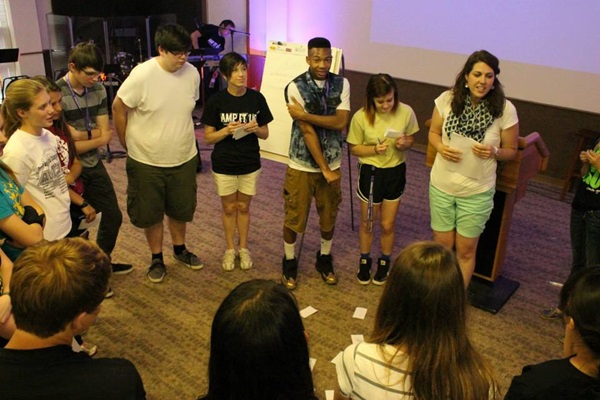The Rev. Tonya Lawrence knows there are often no easy answers when it comes to helping young people map their futures. Lawrence, who has worked with youth and young adults for years, became the vocational discernment coordinator for the North Georgia Conference in Atlanta in July 2014.
Teenagers, college students and other young people can find it challenging to realize how their vocation can match up with their goal to make a living. One's occupation may not coincide with one's passion, and that division may lead to a career that is not fully satisfying.
Lawrence recently had a chance to mentor a high school senior who was having second thoughts about a career choice she had held for years. She saw an opportunity to show how vocation and occupation can intermingle with God's direction.
"This young lady has been interested in becoming a pharmacist for years," says Lawrence. "However, she began to reconsider that after thinking she may be interested in missions instead. I encouraged her to continue to pursue her studies in order to become a pharmacist, because there are many places around the world where there is little access to medical treatment and she could be in mission and share that knowledge."
As it happens, the teen will enter college this fall to pursue a career in pharmacy. She also plans to go on a mission trip this summer, according to Lawrence.
"It's important to talk about these issues and to explore them with young people," Lawrence adds. "It's important to give them options and to encourage them to try different things. And it's important for them to connect with God in the midst of that experience.
"I didn't want to give her an answer as much as try to guide her and give her some what-ifs along the way."
‘Windows to God'
Leaders are forever seeking a balance as they try to help youth and young adults find their way in life and in livelihood. Similarities and differences between one's passion, vocation and occupation may be hard to discern.
"Hopefully, they intersect, but in our culture that's very difficult," says the Rev. Schuyler Rhodes, superintendent of the Bridges District of the California-Nevada Conference.
"Ideally, I think if we are being a Christian community, we empower people so that what they do, their passion intersects with vocation and that becomes their occupation," he continues.
"Students today coming out of college are so deeply in debt they just have to work to get out of debt, and the opportunity to explore their passion ... is becoming harder and harder.
"You can help people find their vocation by discovering their passion," he says, "and if they pursue their passion, therein perhaps often lies their vocation. If they're really, really determined, and they're lucky, that can be the way they make money.
"Our work is to stir the embers, get the fires of passion burning and find ways in our context that we can do that."
To begin, says the Rev. Ashlee Alley of the Great Plains Conference, it is important for young people to understand the meaning of "vocation." It comes from the Latin word "to call," she explains, though many may associate it with vocational tech schools.
"My favorite quote on this idea of vocation is from (author and theologian) Frederick Buechner," says Alley, who is conference clergy recruitment and development coordinator and was previously campus minister at Southwestern College in Winfield, Kansas. "He says vocation is where your deep gladness meets the world's deep need. I think that gives us this idea that our passions are actually windows to God. Things that we enjoy could be an indicator for what God has called us to do.
‘Being with young people where they are'
"It is so important to talk to young people about this because of this idea that if you set your chart straight ahead but you're one degree off, then by the time you end up miles and miles away, you're really far off," Alley continues. "But if you make that adjustment at the beginning, you can stay straight on course. It's so important to talk to young people because they're just beginning to make those decisions."
Lawrence's role is to connect with churches in an effort to find more young people with diverse ethnic backgrounds to enter the ordained ministry. She agrees that it is critical to help youth consider both vocation and occupation.
"I think about a lot of people that reach midlife or beyond, wake up one day and say, ‘I was supposed to do something completely different, and I've wasted time or I'm not happy,'" Lawrence explains. "If someone could have been involved in helping them discern earlier on, then I wonder how much happier they would have been down the road."
To connect with the young age group, Rhodes says, it is important that clergy and leaders be authentic.
It is about "being with young people where they are," he says. "I think we often love young people where we want them to be, but not actually where they are. That means we have to change our location and go to where young adults and young people really are living and where their lives and contexts are.
"It's not just about what do we do for them, but how can they be our teachers. Youth have a lot to teach us about faith and about God in many, many ways."
John McBryde is a freelance writer in Franklin, Tennessee.

